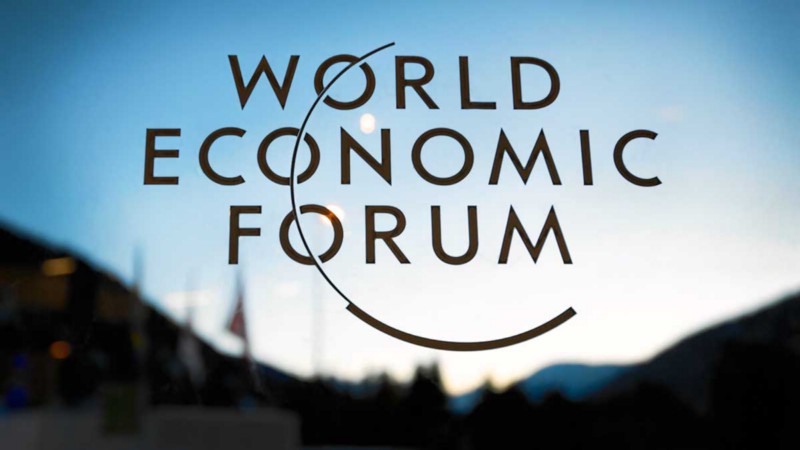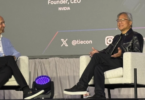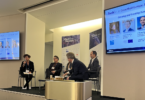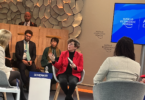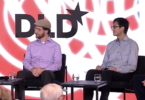The official theme of the World Economic Forum’s annual meeting in Davos this year was Globalization 4.0: Shaping a Global Architecture in the Age of the Fourth Industrial Revolution.” While the state of the global economy and political issues are always on the agenda the impact of technology on business and society was a big focus this year. A key takeaway was that business must join governments in defining the shape of Globalization 4.0 and create an optimal governance architecture in areas such as data privacy, cybersecurity and digital identity , as neither side can tackle these issues alone. Trust needs to be established and so does a new social contract. “Digitalization is transforming and disrupting every area of our lives so normal institutions and frameworks and ways of thinking are now being re-evaluated and questioned,” Derek O’Halloran, the Forum’s Head, Future of Digital Economy and Society, and Member of The Executive Committee, said in an interview in Davos with The Innovator. “Policies coming out of one industry or one government department are not enough….we need to establish high level goals and frameworks .”
The business community needs to step up and play a leading part in reconfiguring the architecture of a Fourth Social Revolution, said Subramanian Rangan, The Abu Dhabi Crown Prince Court Endowed Chair in Societal Progress at INSEAD, France. “They must ask themselves big questions — how do we handle human capital, who owns data, what do we want artificial intelligence to do?” He called for “moral entrepreneurship”, with CEOs showing courage in leading shareholders to a new way of seeing the enterprise. “Even as you deepen cyber capital, you must deepen your moral capital,” he said.
Data Privacy :
Government officials such as Japanese Prime Minister Shinzo Abe called for a new system for the oversight of data use as did the leaders of Salesforce, Microsoft and Apple.
As Salesforce founder and co-CEO Marc Benioff pointed out in a fireside chat with Forum Chairman Klaus Schwab, social media platforms have lost the public’s trust :
« If we were here at the World Economic Forum three or four years ago, we would be talking about those companies as if they’d just walked off of Mount Sinai, » said Benioff. « The reality is that now we’re talking about where did they actually come from? Maybe it wasn’t a high place. »
“Those companies need to make a decision — are they going to be in the trust revolution or are they going to be in a crisis of trust like they are now?,” said Benioff. “They’re being called in front of Congress. You can see their executives are walking out. You can see their employees are walking out. You can see their customers are voting on this already. The thing that is most surprising to me is that they cannot get on a stage and say, ‘Trust is our highest value, we’re sorry, we made a mistake and we will go forward with trust’.
Microsoft CEO Satya Nadella and Apple CEO Tim Cook — both present in Davos this year — are also publicly calling for more vigilance in guarding data privacy. In the run-up to Davos Nadella went so far as to say that privacy should be considered a human right and praised Europe’s new General Data Protection Regulation (GDPR) that sets stringent privacy standards for any company with business in the European Union. Apple’s Cook also recently applauded GDPR, calling for similar federal privacy regulation in the U.S.
But passing government rules like GDPR or breaking up companies like Facebook or Google are not enough to put the power over personal data back in the hands of consumers.
During the annual meeting Forum executives met with Sir Tim Berners-Lee, the creator of the World Wide Web, to discuss how his approach to data privacy might be scaled. Solid builds on current web standards by extending them to provide a distributed data service. Individuals and organizations keep their data in Personal Online Data stores known as PODS. PODs are designed to be secure, and the owner can provide access to portions of their data, as well as revoke it as needed.
And, at an unofficial event in Davos organized by MIT and Tata Consulting Services, another solution was discussed that could empower citizens and workers as well as traditional enterprises, providing a counter weight to the power of Silicon Valley and Chinese Internet giants.
When the global economy was first transformed by industrialization and then by consumer banking powerful players emerged that concentrated power in the hands of a few. Citizens joined together to form trade unions and cooperative banking institutions, which were federally chartered to represent their members’ interests. The same collective organizations could be used to shift the balance of power away from giant Internet players and place it in the hands of workers. That’s the thesis of a project MIT is working on that was being promoted at the Davos event.
In the U.S. alone almost 100 million people are members of credit unions, not-for-profit institutions owned by their members and already chartered to securely manage their members’ digital data and to represent the wide variety of financial transactions, including insurance, investments and benefits. « The question then is, could we apply the same push for citizen power to the area of data rights in the ever-growing digital economy ?’asks a white paper signed by MIT Connection Science professors, UNI Global Union and the MIT Federal Credit Union
Advanced computing technologies make it possible to automatically record and organize all the data that workers knowingly or unknowingly give to companies and the government and to store these data in credit union vaults. The MIT Trust Data Consortium has built and demonstrated pilot versions of such systems already. And, almost all credit unions already manage their accounts through regional associations that use common software, so widespread deployment of data cooperative capabilities could -at least theoretically — be both quick and easy.
« By leveraging cooperative worker and citizen organizations that are already charted in law virtually everywhere in the world, along with technology that has already been demonstrated, we can…change this situation and create a sustainable digital economy that serves the many and not just the few, » says the white paper.
Traditional enterprises could potentially benefit because — with worker buy-in — they could buy data about hundreds of millions of workers — and compensate them for their data. This system would allow traditional enterprises access to large pools of data that today are only available to large Internet giants while giving individuals collective bargaining power and control over their own data, says MIT university professor Alexander « Sandy » Pentland, a speaker at the Davos event.
Artificial Intelligence
Global spending on AI is forecast to reach $52 billion in 2021, achieving a compound annual growth rate of $46.2 from 2016. How should decision-makers and boards plan their AI strategies?
An AI toolkit the Forum developed to help companies avoid legal and ethical pitfalls was launched during the annual meeting. As more companies adopt artificial intelligence, employees and the public need to trust that the algorithms deployed will not introduce or reinforce biases. Concerns regarding racial or gender bias in AI have arisen in areas such as hiring, policing, judicial sentencing and financial services. BBVA, the large Spanish bank, has already agreed to pilot the toolkit and the Forum is hoping a half dozen other companies will as well.
A global “Artificial Intelligence Council” was established which will be co-chaired by Sinovation Ventures CEO Kai-Fu Lee and Microsoft President Bradford L. Smith. Other members of the AI Council include British Prime Minister Theresa May, Canadian Federal Minister for Innovation, Science and Economic Development Navdeep Bains, the South African Minister of Science and Technology Mmamoloko Kubayi-Ngubane plus academic experts such as Canadian computer scientist Yoshua Bengio, Stanford University Professor Li Feifei, and tech personalities Tencent CEO Pony Ma, Salesforce President Alex Dayon and Accenture CTO Paul Daugherty.
Cybersecurity:
The Forum issued a report entitled “Cybersecurity Scenarios for 2025. The report asks business leaders to imagine scenarios such as “What kind of chaos and security risks would ensue if black makers and criminal embrace quantum computing faster than companies and national governments?” The goal of the report was to spark more systems thinking and encourage companies and governments to work together.
The Forum emphasized the importance of The Paris Call, a framework for multilateral action on cybersecurity which has been signed by 64 states, more than 300 private-sector companies and over 150 NGOs and other civil society organizations.
“It’s really about keeping the world safe,” Brad Smith, President and Chief Legal Officer of Microsoft, said in a statement. “The world depends on digital infrastructure, it depends on our devices, and they’re under attack every single day.”
While noting that the Paris Call has been signed by all 28 members of the European Union and by all but one member of NATO, as well as other democratic states, including Australia, Japan, New Zealand, Singapore and South Korea, Smith singled out two holdouts: India and the United States. “The world’s biggest democracy needs to stand with the world’s other great democratic nations,” he said. “The world needs India.”
Smith attributed US reluctance to sign to the current American administration’s aversion to multilateralism, but warned, “Some of the most serious attacks are those against democracy itself. The most significant threat is to voting systems.”
Although he acknowledged the difficulty of assessing the actual impact of interference operations on the outcome of the 2016 US election, Smith said, “Let’s focus on what we do know. We do know that 30 million Americans have read intentional disinformation by governments, and they shared it, they liked it, and they believed it. It was done with the goal of disrupting democracy. It was not limited to the United States alone … Every single candidate running for the French presidency was attacked in some way. It is a problem, a threat to democracy, and needs to be addressed.”
Digital Identity
Getting digital identity right will be key to everything from the efficiency of The Internet of Things to social inclusiveness.
- A report the Forum compiled with McKinsey on digital ID coverage was released. The report says digital IDs could unlock economic value equivalent to 3% to 13% of GDP in developed and emerging economies. However, without proper controls digital ID system administrators — whether they be private firms or governments — will gain access to and control over individual data and could misuse it. The right controls need to be in place rapidly as soon every person and every physical object will be given a digital identifier. The problem involves multiple industries and transcends national boundaries so a global approach is necessary.
- Members of the Forum’s Platform for Good Digital Identity announced plans for supply chain pilots that bring together digital identity and digital payments to improve transparency, accelerate financial and digital inclusion of smallholder producers and directly rewarding them for sustainable practices.
- The ID2020 Alliance launched a digital identity ‘certification mark,’ to incentivize the design and use of digital identity solutions that adhere to the highest standards of privacy protection, user control and interoperability.
E-Commerce:
A group of 70-plus countries confirmed intentions to commence WTO negotiations on trade-related aspects of e-commerce following a ministerial meeting in the margins of the Annual Meeting. Shortly before the January 25 announcement, members of the Forum’s business and civil society trade community issued a statement calling for a new digital trade deal that would reduce costs and facilitate greater participation in the global digital economy.
During the annual meeting Alibaba announced that it was extending its electronic world trade forum initiative, which seeks to lower barriers to trade for small and medium businesses to Rwanda. It already operates in Malaysia and Belgium. The benefits of using the service include speedy customers clearance, logistics support and minimal tariffs. It is an example of how technology and technology companies are managing to find ways around problems that governments have so far failed to solve. Technology platforms that facilitate interactions and capture data will have an increasingly larger role to play in international trade, Sangeet Paul Choudary, a member of the Forum’s Digital Platforms & Ecosystems executive working group, said in a blog posting. “As these platforms get bigger and benefit from winner takes all scenarios, we may see control points over trade shifting from political countries to digital platforms,” he says. “Make no mistake: The rise of platform-led trade is one of the defining shifts of our time.”
The Future Of Work
Technology’s role in job displacement was another strong focus. The Forum’s Closing the Skills Gap Initiative, launched in 2017 with a target to reskill or upskill 10 million workers by 2020, announced it has already secured pledges for training more than 17 million people globally, 6.4 million of whom have already been re-skilled. The Forum also announced that the initiative is now supporting public private partnerships aimed at promoting future skills in four countries: Argentina, India, Oman and South Africa.
Paul Kagame, President of Rwanda, said that it is imperative that all African countries make investments in human capital to bring them into the 21st century. Kagame chairs the Smart Africa initiative, which aims to put ICT at the centre of the continent’s national socio-economic development agenda, improve access of Africans to technology and use ICT to promote sustainable development. Internet connectivity in Africa is just 22%, which shows the opportunity that technology offers the continent to move into the digital age.
Smart Africa is the result of the realization among Africans that their future is, or should be, a digital one, said Kagame. The initiative aims to get political leaders to align their efforts and policies with this goal, he said. There is already a mindset change in governments about the importance of technology as they seek to address the needs of growing numbers of young people.
The Global Race For Tech Dominance
There was much discussion about the race for tech dominance and the fact that Europe lags behind. The Forum’s Digital Europe initiative — which involves politicians, investors and entrepreneurs — hopes to put the building blocks in place to help the Continent become a global leader.
Drones
The Indian state of Andhra Pradesh announced will adopt the Forum’s Advanced Drone Operator’s Toolkit: a policy framework developed in collaboration with 10 civil aviation authorities, eight international governmental organizations and 23 private companies, including the governments of Rwanda and Switzerland. The move paves the way for Andhra Pradesh to scale up commercial drone activity.
Climate Change and Environment
There was much talk at this year’s Davos about the responsibility of both companies and governments to stop climate change and take responsibility for cleaning up the environment.
- Google and SAP announced Circular Economy 2030, a $400,000 competition to support entrepreneurs that promote sustainable consumption and production.
- Twenty-five global businesses announced they would work with Terracycle, a recycling specialist, to launch the Loop Alliance Initiative, a scheme that enables consumers to buy a variety of products in customized, brand-specific durable packaging that is collected, cleaned, refilled and reused.The idea for Loop was founded at the World Economic Forum by TerraCycle and consumer product companies Procter & Gamble, Nestle, PepsiCo, Unilever, Mars Petcare, The Clorox Company, The Body Shop, Coca-Cola European Partners, Mondelēz International, Danone, Jacobs Douwe Egberts, Lesieur, BIC, Beiersdorf, RB, People Against Dirty, Nature’s Path, Thousand Fell, Greenhouse, Grilliance, Burlap & Barrel Single Origin Spices, Reinberger Nut Butter, CoZie and Preserve; food retailer Carrefour;logistics and transportation company UPS and Suez, a sustainable resource management. The service will be launched in May, first in France via Carrefour and then in the northeastern U.S. with additional markets expected to launch throughout 2019 and 2020
- The pressure on companies to take responsability for their used products was also underscored in an announcement concerning the amount of electronic waste, which is expected to rise from close to 50 million tons today to 120 million tons by 2050. Only 20% of plastics and electronics are currently recycled. The Nigerian government, Global Environment Facility (GEF) and UN Environment joined with Dell, HP, Microsoft and Philips to launch a $15 million investment to create a formal e-.waste recycling industry in Nigeria. The partnership was convened on the World Economic Forum’s Platform for Accelerating the Circular Economy.

